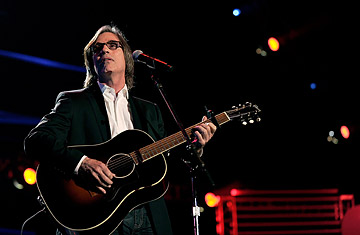
Musician Jackson Browne joined the board of a network of charter schools in South Central Los Angeles in November 2010
Jackson Browne is a commercially successful and critically acclaimed musician. (When he was inducted into the Rock and Roll Hall of Fame, Bruce Springsteen did the honors.) He is also a longtime activist on causes ranging from Tibetan independence to opposing nuclear power. And now he has added school board member to his résumé. In November, Browne, 62, joined the board of the Inner City Education Foundation (ICEF), a high-performing network of publicly funded charter schools in South Central Los Angeles. With 15 campuses and 4,600 students, ICEF's schools are among the best in the city; 100% of its graduating seniors get into college, and 91% are still enrolled three years later. This is no fairy-tale operation, however. The school made news this fall when fiscal problems prompted management changes, and just this week ICEF announced a new $10.5 million infusion of funds from individuals and foundations.
But the money issues haven't stopped Browne from describing ICEF's founder, Mike Piscal, as an incredible example of someone who rolls up their sleeves to solve a social problem. I spoke with the Hall of Famer turned school board member about his sympathy for parents who opt out of traditional public schools, why he never went to college and what qualifies him to help bring education reform to inner-city students.
You have a history of activism on a host of issues. Why education?
I've always supported education, especially music education in Los Angeles public schools. It goes hand in hand with my other activism. There should be access for everyone, and public education doesn't effectively address this right now.
There are a lot of schools in Los Angeles, so why choose ICEF?
Fernando Pullum [ICEF's music director]. We formed the Success through the Arts Foundation. We went from supporting music programs to helping put on school plays, a film program and college counseling. His teaching was a great lightning rod for these kids to grab hold of their lives and make the effort. And it showed that there was something waiting for them if they did.
Fernando was at [a Los Angeles public school] before he went to ICEF. In South Central, schools have none of the resources that schools in more-affluent parts of town do. But they literally penalized us for our efforts. They cut resources to the school because they saw that they had an affluent group giving support. So we didn't say we weren't going to work in the district, but we followed Fernando to ICEF.
What do you bring to a public charter school board?
I'm committed to preserving the arts and music programs, and my experience doing fundraising and benefits will be an asset. More generally, it's crazy that the arts are not funded by the schools, because they are a huge aid to human development. And it's the first thing that gets cut, as though it's something extra. The values you get from working in a community in a class play or an orchestra teach you how to be part of a community in general. These are answers to problems from gang membership to consumer culture.
What's your own educational background?
I have a high school education. I didn't think I had the time to go to college and didn't think I'd be able to learn what I wanted to learn. I was in school during the free-speech movement, when Berkeley blew up and, of course, the civil rights movement was going on. It was revolutionary, and I really felt school was on the side of the status quo. I got into a debate with one of my civics teachers. I objected to his characterization of the free-speech movement as crazy. I said, "What do you mean 'crazy?' " And it got worse from there. He was going to discuss how they looked and their demeanor — not the ideas. I got bounced out, not because of anything I did. I did what you were supposed to. I asked questions.
Charter schools are controversial, and ICEF is as well. Does your involvement bring you into conflict with people you've worked with on other issues?
The self-empowerment of charters is very much like the movements to improve water quality or oppose nuclear plants. There is no question that the charter-school movement is very important and is an expression of people's desire to do something excellent for their children. That goes hand in hand with my impulse as an artist. To take matters into my own hand.
People have developed the expectation that there is someone they can elect to take care of this for them. It's not true. In every case, we've shown again and again you have to do this yourself.
Honestly, I think people are faced with a dilemma — when your kids are growing up, you can't wait for them to fix the school system. I've heard activists speak about this, that if you want to have great public schools, you have to be a public-school parent. But I found the school for my kid was not really equipped to deal with my son's needs. So I believe in fixing the public schools, but I sympathize with parents who don't have the time. Their kid will be out of school by the time it's fixed. All the questions about unions and teachers, I think they're real. But I'm moved most by parents who will do whatever it takes to get their children a great education.
Andrew J. Rotherham, who writes the blog Eduwonk, is a co-founder and partner at Bellwether Education, a nonprofit working to improve educational outcomes for low-income students. School of Thought, his education column for TIME.com, appears every Thursday.
